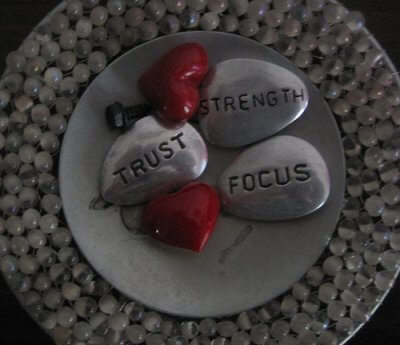Rebuilding Trust in a Relationship – Life After Betrayal

By: Gabriele Barni
by Andrea M. Darcy
Your partner cheated, your colleague stole your big idea, your friend shared your secret with everyone… Whatever the situation, betrayal can leave us wondering whether to cut ties or to try rebuilding trust in a relationship.
KEY TIPS TO REBUILDING TRUST IN A RELATIONSHIP
1.Forget about forgiveness.
Forgiveness is hailed as the holy grail of moving on but it can actually keep you stuck. For starters, it is misunderstood. Forgiveness is not what is required before healing can happen. Quite the opposite. Forgiveness tends to come as a natural byproduct of working to heal and move on.
Focussing on forgiving the other puts your focus on what you feel you have to forgive – their lies, cheating, etc – instead of on what is actually required for rebuilding trust. For that you need to start looking at what is working between you, not on what went wrong.
2. Start a new inventory.
Commit to putting aside those inventories in your head that you are keeping on all the little things they have ever done wrong. All the ways you ‘should have seen it coming’, all the flaws to the relationship. What we focus on grows. These sorts of lists will never allow trust to grow again.
Start a new inventory looking very carefully at the trust that exists between you right now, despite the betrayal.

By: DiddyOh
It might be micro-trust, but its still trust. Do you trust a partner to drive you to work safely? To take care of your kids? To cook a meal that is edible? Do you trust a friend to arrange a birthday party? Trust a colleague to give back your hole punch after borrowing it, or make you a coffee?
Write down every little way you trust the person you feel betrayed by and keep adding to it whenever a small moment of trust happens. If you really can’t find any tiny way you trust the other person, it might be time to rethink your effort to keep this relationship afloat.
3. Be emotional.
Stuffing down your emotions after a betrayal might work temporarily. But it ultimately results in passive aggressive behaviour. This means even if trust does start to build between you and the other person, you will be the one sabotaging it this time, with mean comments, last minute cancellations, and talking about the person behind their back.
When we are betrayed it can be a like a magnet that pulls up any and all betrayal we’ve experienced in our lifetime. So we don’t feel just angry, we feel enraged, and we don’t just feel like the rug has been pulled out from under us, we feel like the world is suddenly a terrible, dangerous place.
Recognise that you might be processing emotions that are older than this situation. Then take the responsibility to work through some of those emotions alone, not at the expense of other people.
Journalling is a great idea. Some people find physical activities like using a punch bag or hitting pillows with fists helpful. If your emotions feel totally overwhelming, consider some sessions with a counsellor. He or she will create a safe space for you to vent.
4. Work to trust yourself.

By: Iqbal Osman1
Betrayal doesn’t just damage our trust of the other person, it damages our trust in ourselves. We are left endlessly tormenting ourselves with questions like, “why was I so stupid, why did I not see it coming, why do I always trust the wrong person, why did I not listen to my friends…”.
If you are going to rebuild trust with someone else you have to be able to trust yourself first. So accept you might have made an error, but acknowledge you had your reasons. Then start looking at ways you have made good decisions in the past and will make them again.
Note that trusting ourselves is easier when we know ourselves well. So if you find self trust hard start looking at ways to know yourself better. This might be journalling, doing some work around identifying personal values, trying new activities, being around new people.
Mindfulness is also a great tool for helping you start to recognise what you truly think and feel in situations (if you don’t know how to do it read our free and easy-to-follow Guide to Mindfulness.).
5. Give it time.
Imagine how long you feel it might take to trust the other person again then double it. This is probably a more realistic take that will leave you less stressed and more able to appreciate the good moments that do arrive between you and the other person.
6. Make the choice that works for you.

By: Luke Baldacchino
It’s very important to ask yourself good questions and to listen to your own feelings instead of what everyone else tells you.
Has the other person committed to rebuilding this relationship with you? Do you feel you want this relationship, or are you trying to make it work to please those around you, like family and friends?
If time passes and you realise this is simply not a relationship for you, it’s okay to change your mind. It is your life. You decide who you spend it with.
Note that if this isn’t the first time the person has betrayed you, then it’s worth looking into trauma bonding. If you had a difficult childhood you might be unable to make a good relationship choice and might need help to get out of this relationship, instead of trying to keep it working.
7. Seek proper support.
If you find that a few months after a betrayal you are increasingly anxious, your moods are often low, or you feel constantly on edge, it is worth seeking professional support. It might be that old trauma has been triggered for you, or anxiety or depression has developed.
You don’t have to feel at wits end to benefit from professional support. Therapy is also good to help you clarify what you really want from a relationship, and from the next stage of your life. Or you might just feel it’s time to troubleshoot the ways you relate to others to ensure you pick better relationships in the future.
Would you like to talk to a warm, friendly, and experienced counsellor or psychotherapist about relationship issues? Harley Therapy connects you with top therapists in central London. Not in London or the UK? Our new sister site harleytherapy.com helps you book online and phone therapy quickly and easily.
Comments are closed on this article, see what others have said below!
 Andrea M. Darcy is a lifestyle and wellbeing writer as well as a coach who often writes about relationships. Find her @am_darcy
Andrea M. Darcy is a lifestyle and wellbeing writer as well as a coach who often writes about relationships. Find her @am_darcy





Hi
Im looking for help as a couple.
My wife is suffering from betrayal trauma.
We need to find someone very experianced in this line of therapy.
We can come as couple or individually.
Please advise
Thank you
Anthony
Hi Anthony, we are going to pass on your email to the admin in charge of therapy as this side we are just editorial, they will get in touch. Best, Andrea, editor